
Worldviews-Global Religions Culture and Ecology
Scope & Guideline
Fostering Dialogue on Faith and Ecological Sustainability
Introduction
Aims and Scopes
- Ecological Theology and Spirituality:
The journal emphasizes the development of ecological theology that integrates spiritual beliefs with environmental stewardship, exploring how religious narratives shape ecological practices. - Cultural Responses to Environmental Challenges:
It examines how different cultures and religious communities respond to environmental issues, highlighting the role of cultural narratives and rituals in fostering ecological awareness and action. - Interdisciplinary Approaches:
The journal promotes interdisciplinary methodologies, merging insights from theology, philosophy, anthropology, and environmental science to provide a holistic understanding of the relationships between religion and ecology. - Indigenous and Subaltern Perspectives:
There is a significant focus on indigenous and marginalized voices in environmental discussions, recognizing their unique contributions and challenges in ecological stewardship. - Critical Analysis of Religious Texts:
The journal frequently features analyses of religious texts and traditions, exploring how they can inform contemporary ecological issues and ethical considerations.
Trending and Emerging
- Climate Change and Religious Responses:
Recent publications show a significant increase in exploring how various religious communities are responding to and interpreting climate change, indicating a growing urgency within faith-based activism. - Ecological Activism and Community Engagement:
There is a notable trend towards highlighting grassroots ecological activism within religious communities, emphasizing the role of faith in mobilizing collective action for environmental justice. - Intersection of Indigenous Theology and Ecology:
The journal is increasingly focusing on indigenous theological perspectives and their contributions to ecological narratives, reflecting a broader acknowledgment of indigenous rights and knowledge in environmental discussions. - Rituals and Practices for Ecological Restoration:
Emerging themes include the exploration of rituals and practices that promote ecological restoration and healing, suggesting a growing recognition of the importance of spiritual practices in environmental recovery. - Ecocriticism and Literature:
There is an upward trend in the publication of ecocritical analyses of literature and arts, examining how cultural expressions reflect and shape ecological consciousness.
Declining or Waning
- Traditional Ecological Knowledge:
There seems to be a decrease in papers specifically addressing traditional ecological knowledge as a standalone theme, possibly overshadowed by broader ecological theology and spirituality discussions. - Historical Studies of Religion and Environment:
The journal has published fewer historical analyses of religion's relationship with the environment, suggesting a shift towards contemporary issues and immediate ecological crises. - Individualistic Spiritualities:
Themes centered on individualistic spiritual practices and their ecological implications have diminished, possibly in favor of community-oriented approaches that emphasize collective action.
Similar Journals
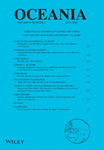
OCEANIA
Pioneering Scholarly Conversations Since 1930OCEANIA, published by WILEY, is a distinguished journal that has been fostering scholarly discourse in the fields of anthropology and the history and philosophy of science since its inception in 1930. With an impressive impact factor and secure positions in the Q2 quartile for both categories, OCEANIA stands out as an influential resource for researchers and professionals alike. Its latest Scopus rankings reflect its commitment to quality, placing it in the 76th percentile for history and philosophy of science and the 66th percentile for anthropology. Though it does not operate under an open access model, the journal provides robust access options for institutions and individuals to explore its rich array of peer-reviewed articles that contribute to the understanding of cultures and scientific thought across the Pacific region and beyond. As we advance toward its continued convergence into 2024, OCEANIA remains a pivotal platform for innovative research and academic debate, cultivating insights that are crucial for scholars and students navigating the complexities of these interconnected disciplines.

Stellenbosch Theological Journal
Connecting faith with scholarship in a dynamic landscape.Stellenbosch Theological Journal is a premier scholarly publication dedicated to advancing the field of theology and religious studies. Published by the PIETER WAAL NEETHLING TRUST, this journal has embraced Open Access since 2015, ensuring that groundbreaking research is readily available to scholars, professionals, and students globally. With its roots in the vibrant academic community of Stellenbosch University, South Africa, the journal serves as a significant platform for high-quality research that engages with contemporary theological debates and issues. Although specific metrics such as H-index and Scopus rankings are currently unavailable, the journal is committed to enhancing academic discourse in theology and invites contributions that explore diverse theological perspectives, historical context, and ethical implications. Accessing the journal aligns with the pursuit of knowledge and expertise in a rapidly evolving field, making it an invaluable resource for today's theologians and religious scholars.
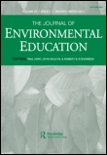
JOURNAL OF ENVIRONMENTAL EDUCATION
Cultivating Knowledge for Sustainable FuturesThe JOURNAL OF ENVIRONMENTAL EDUCATION, published by ROUTLEDGE JOURNALS, TAYLOR & FRANCIS LTD, stands as a premier platform for scholarly discourse at the intersection of education and environmental stewardship. Since its inception in 1971, this esteemed journal has been pivotal in advancing the understanding of environmental education, fostering innovative teaching practices, and promoting sustainable development through education. With an impressive impact factor and recognized within Q1 quartiles for both Education and Environmental Science disciplines in 2023, it ranks within the top echelons of its field, with Scopus ranks highlighting its significant impact and influence. The journal features original research, reviews, and case studies that cater to a broad audience of educators, researchers, and policymakers committed to environmental literacy and innovation. Although it does not offer open access options, the journal's content remains vital for advancing the field of environmental education, making it an essential resource for anyone dedicated to enhancing educational practices and promoting ecological awareness.
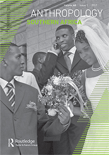
Anthropology Southern Africa
Championing high-quality research in anthropology and beyond.Anthropology Southern Africa is a prestigious journal published by Routledge Journals, Taylor & Francis Ltd, and is dedicated to advancing the field of anthropology through rigorous scholarship and critical discourse. Established in 2013 and converging through 2024, this journal sets a high standard in its category, currently holding a Q2 classification in Anthropology and a Q1 ranking in Cultural Studies for the year 2023, ensuring its position as a significant contributor to social science research. With a robust Scopus ranking that places it in the 82nd percentile for Cultural Studies and the 67th percentile for Anthropology, Anthropology Southern Africa serves as an essential platform for researchers, professionals, and students engaged in anthropological inquiry and cultural analysis. Although it is not openly accessible, the publication prides itself on high-quality submissions that explore diverse cultural phenomena and anthropological perspectives, thereby inviting interdisciplinary engagement and fostering a global academic dialogue.

International Journal of Public Theology
Exploring the Nexus of Faith and SocietyInternational Journal of Public Theology, published by BRILL, stands at the intersection of faith, society, and academic inquiry. With an ISSN of 1872-5171 and an E-ISSN of 1569-7320, this journal is pivotal for scholars engaged in Religious Studies, Sociology, and Political Science. The journal boasts notable rankings in Scopus, being positioned at 167/644 in the field of Religious Studies, reflecting a 73rd percentile standing, while also contributing to the sociological discourse with a rank of 1006/1466 and a 31st percentile. As it converges through years from 2013 to 2024, it critically engages with contemporary issues at the nexus of public theology and societal dynamics, making it an essential resource for researchers, professionals, and students committed to exploring the role of faith in public life. For those eager to disseminate and access high-quality research, this journal offers a vital platform within the academic and theological discourse.

Ecosistemas
Exploring the intricate web of ecosystems and sustainability.Ecosistemas is a prominent Open Access journal published by the ASOCIACION ESPANOLA ECOLOGIA TERRESTRE, specializing in the field of ecology. Since its inception in 2001, it has dedicated itself to advancing ecological knowledge and research, fostering an inclusive platform for the dissemination of cutting-edge studies that span ecological interactions, sustainability, and biodiversity. The journal, based in Spain, has established its reputation with notable rankings such as Q3 in the field of Ecology and Q4 in Ecology, Evolution, Behavior, and Systematics, reflecting its commitment to quality research. With a Scopus Ranks position placing it in the 40th and 37th percentiles for its categories, Ecosistemas is integral to the academic community, serving researchers, professionals, and students alike. It provides a vital resource for those seeking to understand ecological dynamics and environmental challenges, facilitating open access to important findings and discussions that shape the future of our ecosystems.

Nature + Culture
Connecting Cultural Narratives with Environmental RealitiesNature + Culture, published by BERGHAHN JOURNALS, focuses on the interdisciplinary exploration of cultural and environmental relationships, bridging the gap between the social sciences and ecological studies. With its ISSN 1558-6073 and E-ISSN 1558-5468, this journal has established itself as a key platform for scholars aiming to advance discussions in an era of rapid environmental change and cultural transformation. Operating from the United States, specifically at 20 Jay St, Suite 512, Brooklyn, NY 11201, it holds a respectable position within the academic community, evidenced by its Q3 ranking in Social Sciences (miscellaneous) for 2023 and its Scopus rank of #132 out of 275 in General Social Sciences. While currently not an Open Access journal, Nature + Culture provides vital insights that address the pressing issues of our time, making it an essential resource for researchers, professionals, and students committed to understanding the intersection of nature and human culture from 2008 through its converging years into 2024.

Annual Review of Ecology Evolution and Systematics
Pioneering Research in Ecology, Evolution, and SystematicsThe Annual Review of Ecology, Evolution, and Systematics, published by Annual Reviews, is a leading academic journal dedicated to advancing the understanding of ecological and evolutionary processes. With a commendable impact factor and impressive rankings—9th in both the Ecology, Evolution, Behavior and Systematics category and the Environmental Science category—this journal is recognized for its rigorous peer-reviewed articles that synthesize research findings across a wide range of topics within the fields of ecology and evolutionary biology. Established in 2003, this annual publication aims to provide researchers, professionals, and students with comprehensive insights into the latest developments and trends within these dynamic disciplines. By facilitating access to high-quality scholarly articles, the Annual Review of Ecology, Evolution, and Systematics continues to play a crucial role in fostering scientific discourse and discovery.
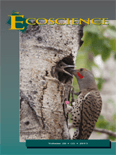
ECOSCIENCE
Elevating discussions on biodiversity and environmental practices.ECOSCIENCE, published by Taylor & Francis Inc, stands as a prominent journal in the fields of Ecology and Environmental Science, recognized for its commitment to advancing knowledge since its inception in 1994. With an ISSN of 1195-6860 and an E-ISSN of 2376-7626, the journal caters to a diverse audience of researchers, professionals, and students passionate about ecological and environmental issues. In 2023, it achieved Q2 and Q3 rankings in the Scopus category of Ecology and Evolution, Behavior and Systematics, reflecting its significance within the academic community. Moreover, ECOSCIENCE occupies notable positions in Scopus rankings, including Rank #324 in Agricultural and Biological Sciences and Rank #210 in Environmental Science, symbolizing its role as a catalyst for disseminating high-quality research. Although currently not open access, the journal's multifaceted scope encourages in-depth discussions on ecological diversity, conservation strategies, and sustainable practices, making it an invaluable resource for those engaged in ecological research and practice.
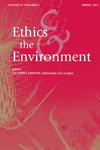
Ethics and the Environment
Fostering Interdisciplinary Dialogue on Ethics and Nature.Ethics and the Environment is a distinguished journal dedicated to the dialogue between ecological considerations and moral philosophy, published by Indiana University Press. With an emphasis on fostering interdisciplinary discourse, this journal addresses the ethical implications of environmental issues, making it an essential resource for researchers, professionals, and students in both the fields of Environmental Science and Philosophy. As of 2023, it holds a notable impact factor with its Q4 ranking in Environmental Science (miscellaneous) and a favorable Q2 ranking in Philosophy, reflecting its relevance and contribution to ongoing scholarly discussions. Although not an open-access publication, it provides valuable insights that hold practical significance for policy-making, conservation efforts, and sustainability practices. With coverage spanning from 2013 to 2024, the journal continues to engage with current global environmental challenges through a philosophical lens, positioning itself as a crucial platform for ethical explorations in environmental discourse.